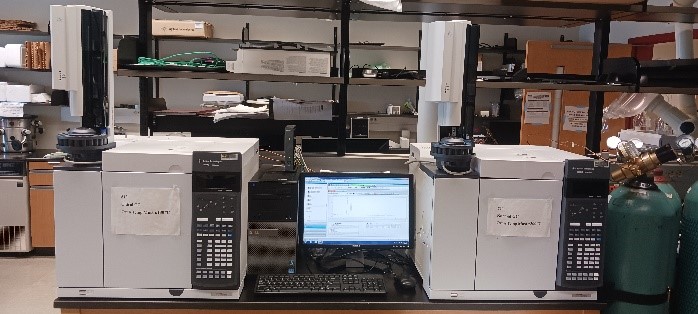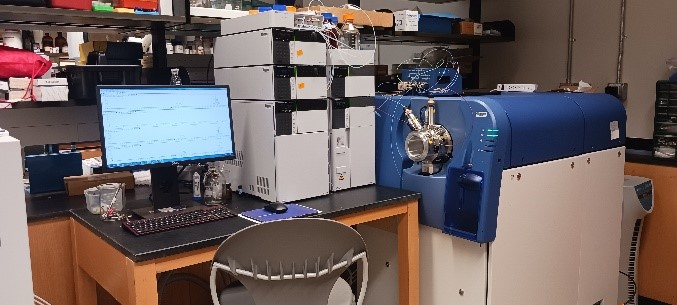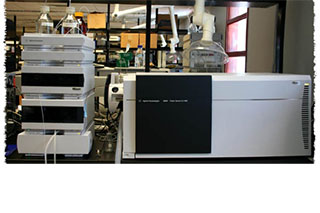Core Facilities
Chemical Purification Analysis and Screening core facility (CPAS)

Laurent Calcul, Ph.D. (Director)
calcul@usf.edu (preferred method)
Phone NES 406/IDRB 318: (813) 974-6031
Fax: (813) 974-3203
Need a Reservation? Please Check the Instrument availability below:
- at CPAS NES 406
- at CPAS IDRB 318
- for the MALDI TOF/TOF at IDRB 318
- for the MST at IDRB 318
OVERVIEW
CPAS operates as a self service core facility and offers its expertise in chromatographic separation and purification (MPLC, HPLC, UHPLC, GC-FID), mass spectrometry detection, identification and quantification (LC-MS SQ, LC-MS QqQ, LC-MS Triple TOF, TDU-GC-MSD, GC-MSD-uECD and GC-MS QTOF [HS-SPME] and MALDI TOF). The services also include Circular Dichroism (CD, VCD), Optical Rotatory Dispersion (ORD), general spectroscopic characterization (UV, FTIR), lyophilization (benchtop and general purpose freeze-dryer), extraction (microwave reactor), synthesis (microwave reactor, hydrogenation apparatus), ADME screening (Parallel Artificial Membrane Permeability [PAMPA - GIT, BBB and skin] and drug solubility evaluation), binding affinity measurement (Microscale Thermophoresis [MST]), and high-throughput screening development capability (liquid handling robot and multimode plate reader). CPAS provides trainings and instruments are available 24/7 in self-service mode and upon reservation for trained users.
- Contact & Billing
- Usage Fees
- Information Poster
- Mass Spectrometry Analysis Form
- Acknowledgement Co-Authorship
USF CPAS EQUIPMENT AND SERVICES (NES 406 and IDRB 318)
CPAS, NES 406

Agilent GC-MSD 5977B
 |
 |
 |

Agilent GC-FID
- Flame Ionization Detector (FID)
- 16-sample turret for liquid injection
- Split/splitless inlet system: - Agilent 7890B GC
- Low polarity, low boiling point small molecules
- GC#1 standard column
- GC#2 chiral column

Dionex ultimate 3000 UHPLC DAD

JASCO Model J-1500 Circular Dichroism Optical Rotatory Dispersion (CD/ ORD) spectrometer

Biotools ChiralIR-2X™ Vibrational Circular Dichroism (VCD) spectrometer
- Simultaneous IR and VCD signal measurements
- Internal Dual PEM (Photoelastic Modulators)
- Biocell (solution)
- SyncRoCell (rotating cell ideal for solid state measurements)
- TempCon-2X (Peltier temperature controller for cell)
- Determine the chiral properties of small organic molecules, peptide, proteins
CPAS, IDRB 318
- Agilent 7890A GC-MS QToF 7200
- Agilent 1260 Preparative HPLC-DAD-MS SQ 6120
- Teledyne-Isco MPLC (UV) and Shimadzu HPLC (UV, ELSD, RID)
- Pion Inc. Parallel Artificial Membrane Permeability Assay (GIT, BBB, Skin PAMPA)
- Pion Inc. Solubility evaluation
- TECAN Infinite M 1000 Pro microtiter plate reader and Freedom EVO 150 liquid handler
- Anton Paar Monowave Reactor 300
- Agilent Cary 60 UV-Vis Spectrophotometer and FTIR 630 Spectrometer
- Labconco Freezone, SP Scientific General Purpose Freeze Dryer (GPFD), rotary evaporators and other concentrators
- Innovatice Technologies Pure Solv Micro solvent purification system for anhydrous solvent preparation

Paar shaker hydrogenation apparatus model 3921
- Explosion Proof Motor and Switch
- 1L shaker bottle
- Treating chemicals with hydrogen in the presence of a catalyst (60 PSI)
- Catalytic hydrogenation, reduction or condensation for organic synthesis

Bruker UltraFleXtreme MALDI- TOF/TOF
- Smartbeam II, 2 GHz for MS and 1 GHz for MS/MS
- FlashDetector™ with 5 GS/s 10 bit digitizer for enhanced dynamic range
- Resolution > 45,000
- Analytes: - Protein, peptide, lipids, natural products and polymer
- Software: - FlexControl, FlexAnalysis, FlexImaging
- Supporting Software: Biotools, Polytools, SCiLS Lab

Nanotemper MicroScale Thermophoresis (MST) Monolith
- Molecular interaction, binding affinity measurements (Kd)
- Fluorescence channels: RED & BLUE
- Dynamic range 1nM to uM
- Up to 24 samples/ run
- Small molecules, proteins, DNA, …
- JOVE MST link.



